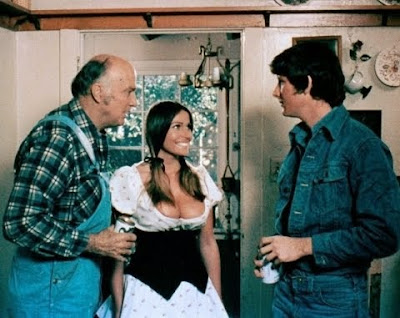West Side Story
At once very dated and to the moment relevant, 1961's WEST SIDE STORY, an adaptation of the Broadway hit, is unique among Hollywood musicals for many reasons.
While many of the NYC locations are created on soundstages, the film has a distinctive faux real urban texture. Tenements, streets, basketball courts, underpasses, etc. all have a lived in, somewhat gritty feel. While we are entirely aware of the pageantry at hand, director Robert Wise has a good sense of the way such a story on the West Side of the city might play: artificial yet convincing enough to be plausible fakery. Put another way, we always know that the drama involving the turf wars between the Caucasian Jets and the Puerto Rican Sharks (and the lovers caught in between) is updated Shakespeare yet within these confines it's still convincing. There is a sense of menace and urgency but examined closely, these youths are really just a few degrees more threatening than the Bowery Boys.
The astonishing choreography, by co-director Jerome Robbins, is distinguished by step work done in time with Leonard Bernstein's elaborate scoring, often incorporating unusual time signatures. The result is a jerky, perhaps less polished round of dance that suits the action. Not just street brawls and knife contests. There's a vibrancy throughout, a real sense of life, but also a nervous energy. An uncertainty. This is a tragedy, after all. Witness the post brawl number "Cool", one of the most complex exercises of its type I've ever seen on film. It apparently was quite a bear to pull off.
While many critics deride leads Richard Beymer (Tony) and Natalie Wood (Maria) for their lack of charisma, not being fiery enough, etc., etc. I think within this artifice they do just fine. Are just right. Each perhaps represents that eternal pie in the sky hope that we can all just get along. That romantic dreams can come true. That love can conquer all within in urban nightmare of racism and poverty. There to level this utopia are Oscar winners Rita Moreno as Maria's friend Anita and George Chakiris as Bernardo, brother of Maria and lover of Anita. They are the voices of (sad) reason, with no illusions of their environment.
And the plight of the unwelcome immigrant infusing WEST SIDE STORY is still as potent as ever. Some of the corny dialogue actually holds weight, and the signature tune "America" nicely sums up what it meant to be Puerto Rican in their new land in the '50s and '60s, and what it means to many others today.



Comments